ENT301: Entrepreneurship and Small Business Management Report
VerifiedAdded on 2021/02/21
|12
|1808
|373
Report
AI Summary
This report delves into the multifaceted world of entrepreneurship and small business management, examining various types of entrepreneurial ventures such as small businesses, large businesses, and social enterprises. It explores the typologies of entrepreneurship, including lifestyle entrepreneurs and growth firms, while highlighting the similarities and differences between these ventures. The report analyzes the impact of these businesses on national, international, and social economies, with specific attention to the UK economy, supported by relevant statistics and data. It discusses the contributions of SMEs to employment, turnover, and overall economic growth, as well as the role of different business sizes in providing job opportunities and improving the standard of living. The report concludes by summarizing the key findings and emphasizing the significance of SMEs in the UK economy.

Paraphrase This Document
Need a fresh take? Get an instant paraphrase of this document with our AI Paraphraser

ENTREPRENEURSHIP
AND SMALL BUSINESS
MANAGEMENT
AND SMALL BUSINESS
MANAGEMENT

⊘ This is a preview!⊘
Do you want full access?
Subscribe today to unlock all pages.

Trusted by 1+ million students worldwide
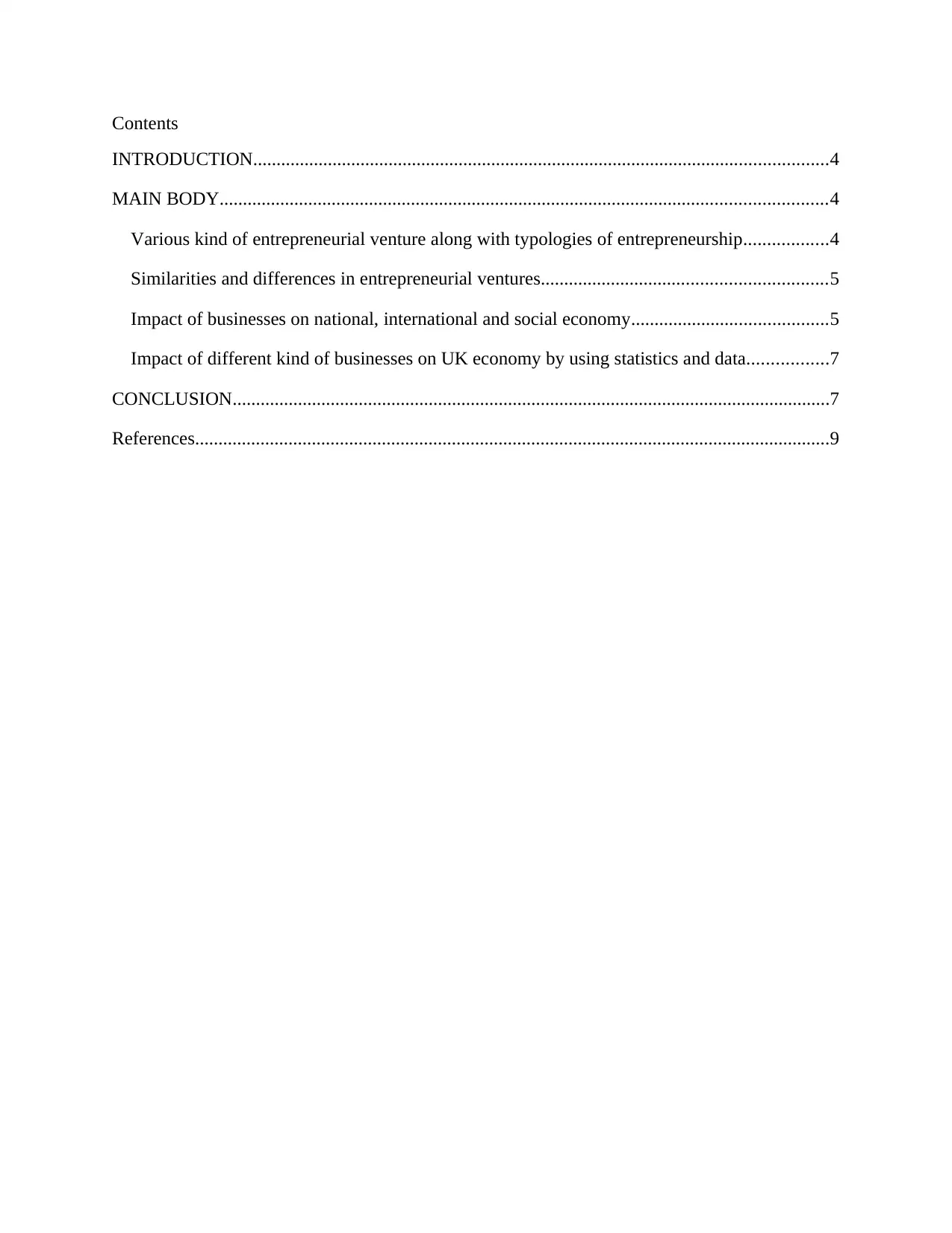
Contents
INTRODUCTION...........................................................................................................................4
MAIN BODY..................................................................................................................................4
Various kind of entrepreneurial venture along with typologies of entrepreneurship..................4
Similarities and differences in entrepreneurial ventures.............................................................5
Impact of businesses on national, international and social economy..........................................5
Impact of different kind of businesses on UK economy by using statistics and data.................7
CONCLUSION................................................................................................................................7
References........................................................................................................................................9
INTRODUCTION...........................................................................................................................4
MAIN BODY..................................................................................................................................4
Various kind of entrepreneurial venture along with typologies of entrepreneurship..................4
Similarities and differences in entrepreneurial ventures.............................................................5
Impact of businesses on national, international and social economy..........................................5
Impact of different kind of businesses on UK economy by using statistics and data.................7
CONCLUSION................................................................................................................................7
References........................................................................................................................................9
Paraphrase This Document
Need a fresh take? Get an instant paraphrase of this document with our AI Paraphraser
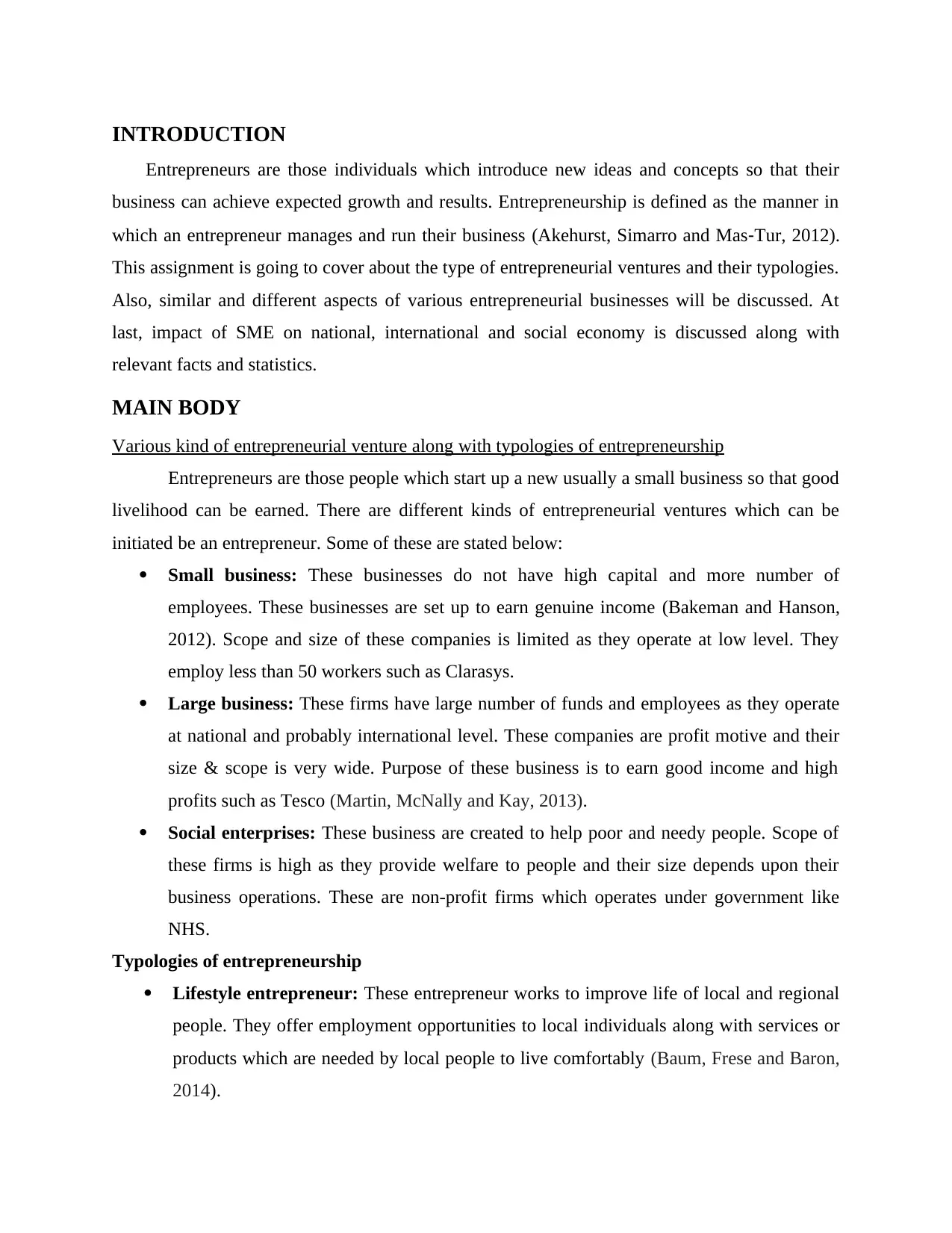
INTRODUCTION
Entrepreneurs are those individuals which introduce new ideas and concepts so that their
business can achieve expected growth and results. Entrepreneurship is defined as the manner in
which an entrepreneur manages and run their business (Akehurst, Simarro and Mas‐Tur, 2012).
This assignment is going to cover about the type of entrepreneurial ventures and their typologies.
Also, similar and different aspects of various entrepreneurial businesses will be discussed. At
last, impact of SME on national, international and social economy is discussed along with
relevant facts and statistics.
MAIN BODY
Various kind of entrepreneurial venture along with typologies of entrepreneurship
Entrepreneurs are those people which start up a new usually a small business so that good
livelihood can be earned. There are different kinds of entrepreneurial ventures which can be
initiated be an entrepreneur. Some of these are stated below:
Small business: These businesses do not have high capital and more number of
employees. These businesses are set up to earn genuine income (Bakeman and Hanson,
2012). Scope and size of these companies is limited as they operate at low level. They
employ less than 50 workers such as Clarasys.
Large business: These firms have large number of funds and employees as they operate
at national and probably international level. These companies are profit motive and their
size & scope is very wide. Purpose of these business is to earn good income and high
profits such as Tesco (Martin, McNally and Kay, 2013).
Social enterprises: These business are created to help poor and needy people. Scope of
these firms is high as they provide welfare to people and their size depends upon their
business operations. These are non-profit firms which operates under government like
NHS.
Typologies of entrepreneurship
Lifestyle entrepreneur: These entrepreneur works to improve life of local and regional
people. They offer employment opportunities to local individuals along with services or
products which are needed by local people to live comfortably (Baum, Frese and Baron,
2014).
Entrepreneurs are those individuals which introduce new ideas and concepts so that their
business can achieve expected growth and results. Entrepreneurship is defined as the manner in
which an entrepreneur manages and run their business (Akehurst, Simarro and Mas‐Tur, 2012).
This assignment is going to cover about the type of entrepreneurial ventures and their typologies.
Also, similar and different aspects of various entrepreneurial businesses will be discussed. At
last, impact of SME on national, international and social economy is discussed along with
relevant facts and statistics.
MAIN BODY
Various kind of entrepreneurial venture along with typologies of entrepreneurship
Entrepreneurs are those people which start up a new usually a small business so that good
livelihood can be earned. There are different kinds of entrepreneurial ventures which can be
initiated be an entrepreneur. Some of these are stated below:
Small business: These businesses do not have high capital and more number of
employees. These businesses are set up to earn genuine income (Bakeman and Hanson,
2012). Scope and size of these companies is limited as they operate at low level. They
employ less than 50 workers such as Clarasys.
Large business: These firms have large number of funds and employees as they operate
at national and probably international level. These companies are profit motive and their
size & scope is very wide. Purpose of these business is to earn good income and high
profits such as Tesco (Martin, McNally and Kay, 2013).
Social enterprises: These business are created to help poor and needy people. Scope of
these firms is high as they provide welfare to people and their size depends upon their
business operations. These are non-profit firms which operates under government like
NHS.
Typologies of entrepreneurship
Lifestyle entrepreneur: These entrepreneur works to improve life of local and regional
people. They offer employment opportunities to local individuals along with services or
products which are needed by local people to live comfortably (Baum, Frese and Baron,
2014).
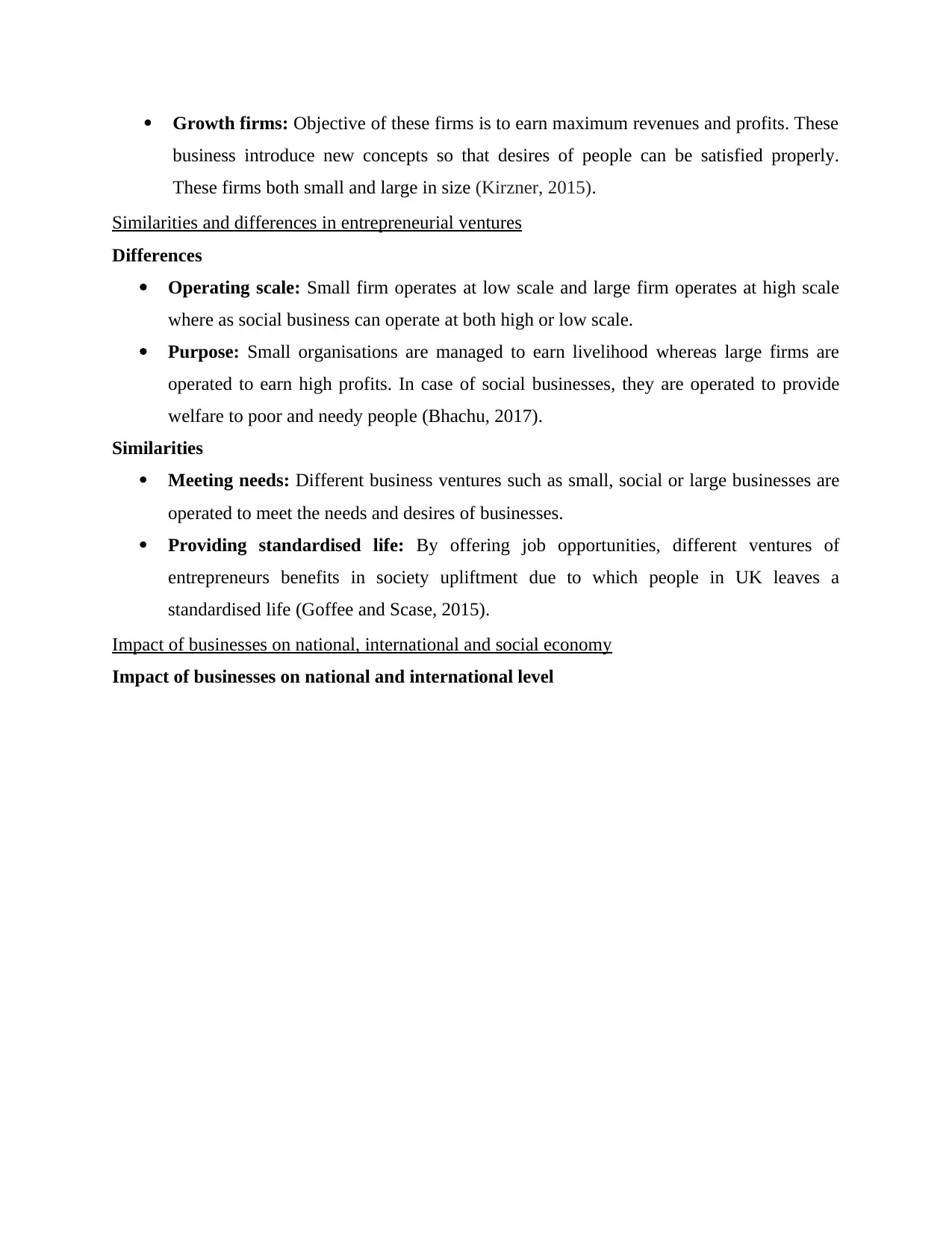
Growth firms: Objective of these firms is to earn maximum revenues and profits. These
business introduce new concepts so that desires of people can be satisfied properly.
These firms both small and large in size (Kirzner, 2015).
Similarities and differences in entrepreneurial ventures
Differences
Operating scale: Small firm operates at low scale and large firm operates at high scale
where as social business can operate at both high or low scale.
Purpose: Small organisations are managed to earn livelihood whereas large firms are
operated to earn high profits. In case of social businesses, they are operated to provide
welfare to poor and needy people (Bhachu, 2017).
Similarities
Meeting needs: Different business ventures such as small, social or large businesses are
operated to meet the needs and desires of businesses.
Providing standardised life: By offering job opportunities, different ventures of
entrepreneurs benefits in society upliftment due to which people in UK leaves a
standardised life (Goffee and Scase, 2015).
Impact of businesses on national, international and social economy
Impact of businesses on national and international level
business introduce new concepts so that desires of people can be satisfied properly.
These firms both small and large in size (Kirzner, 2015).
Similarities and differences in entrepreneurial ventures
Differences
Operating scale: Small firm operates at low scale and large firm operates at high scale
where as social business can operate at both high or low scale.
Purpose: Small organisations are managed to earn livelihood whereas large firms are
operated to earn high profits. In case of social businesses, they are operated to provide
welfare to poor and needy people (Bhachu, 2017).
Similarities
Meeting needs: Different business ventures such as small, social or large businesses are
operated to meet the needs and desires of businesses.
Providing standardised life: By offering job opportunities, different ventures of
entrepreneurs benefits in society upliftment due to which people in UK leaves a
standardised life (Goffee and Scase, 2015).
Impact of businesses on national, international and social economy
Impact of businesses on national and international level
⊘ This is a preview!⊘
Do you want full access?
Subscribe today to unlock all pages.

Trusted by 1+ million students worldwide
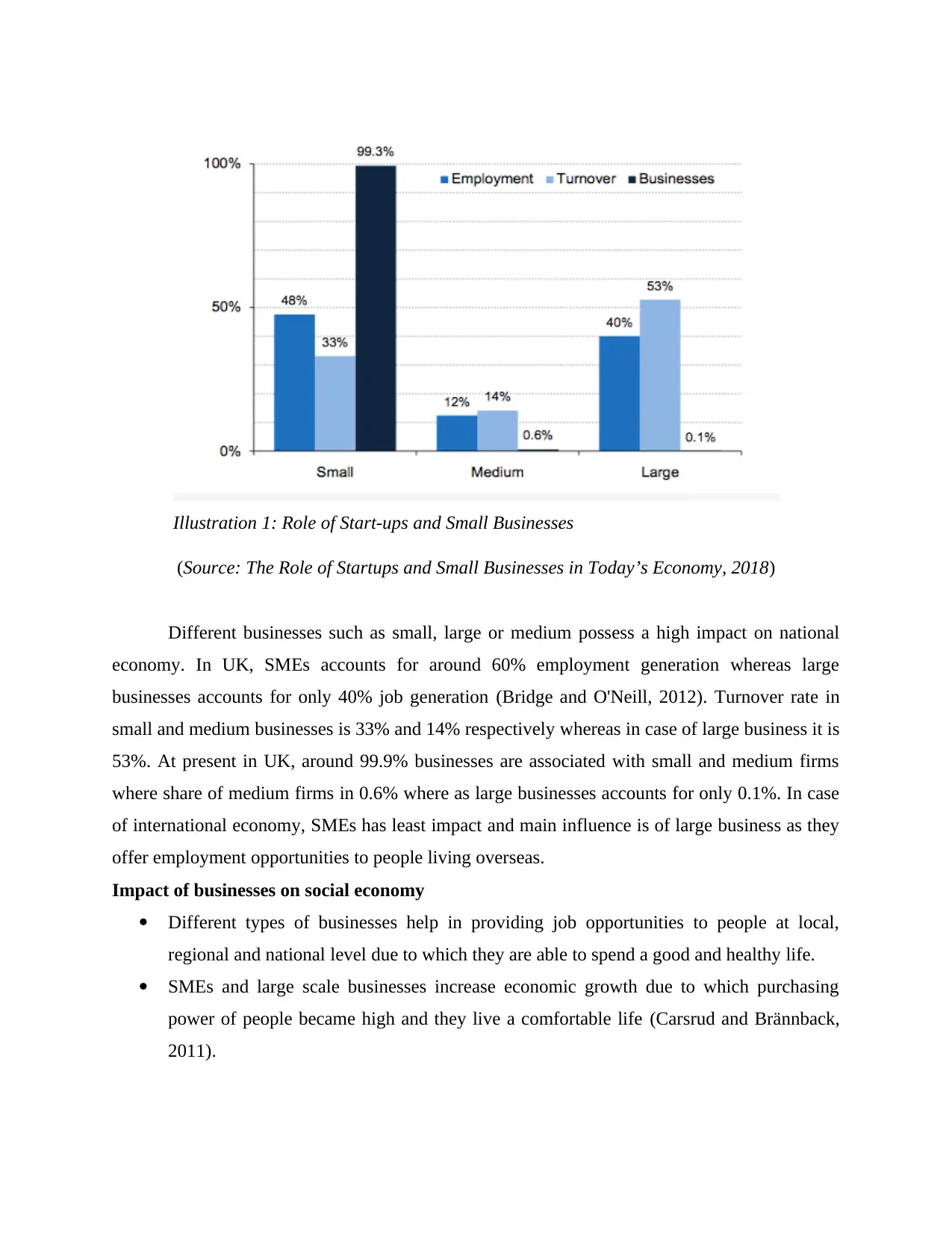
(Source: The Role of Startups and Small Businesses in Today’s Economy, 2018)
Different businesses such as small, large or medium possess a high impact on national
economy. In UK, SMEs accounts for around 60% employment generation whereas large
businesses accounts for only 40% job generation (Bridge and O'Neill, 2012). Turnover rate in
small and medium businesses is 33% and 14% respectively whereas in case of large business it is
53%. At present in UK, around 99.9% businesses are associated with small and medium firms
where share of medium firms in 0.6% where as large businesses accounts for only 0.1%. In case
of international economy, SMEs has least impact and main influence is of large business as they
offer employment opportunities to people living overseas.
Impact of businesses on social economy
Different types of businesses help in providing job opportunities to people at local,
regional and national level due to which they are able to spend a good and healthy life.
SMEs and large scale businesses increase economic growth due to which purchasing
power of people became high and they live a comfortable life (Carsrud and Brännback,
2011).
Illustration 1: Role of Start-ups and Small Businesses
Different businesses such as small, large or medium possess a high impact on national
economy. In UK, SMEs accounts for around 60% employment generation whereas large
businesses accounts for only 40% job generation (Bridge and O'Neill, 2012). Turnover rate in
small and medium businesses is 33% and 14% respectively whereas in case of large business it is
53%. At present in UK, around 99.9% businesses are associated with small and medium firms
where share of medium firms in 0.6% where as large businesses accounts for only 0.1%. In case
of international economy, SMEs has least impact and main influence is of large business as they
offer employment opportunities to people living overseas.
Impact of businesses on social economy
Different types of businesses help in providing job opportunities to people at local,
regional and national level due to which they are able to spend a good and healthy life.
SMEs and large scale businesses increase economic growth due to which purchasing
power of people became high and they live a comfortable life (Carsrud and Brännback,
2011).
Illustration 1: Role of Start-ups and Small Businesses
Paraphrase This Document
Need a fresh take? Get an instant paraphrase of this document with our AI Paraphraser
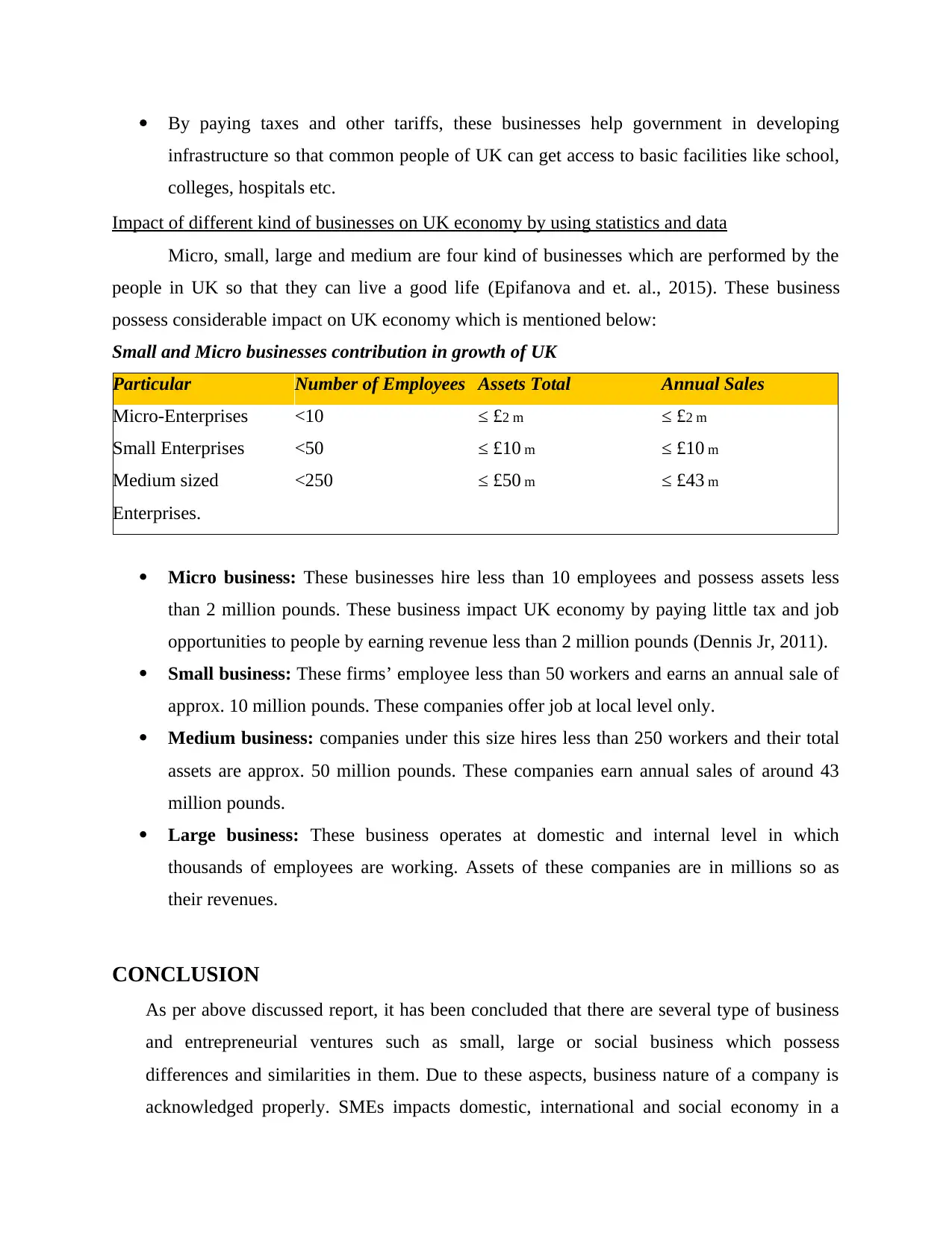
By paying taxes and other tariffs, these businesses help government in developing
infrastructure so that common people of UK can get access to basic facilities like school,
colleges, hospitals etc.
Impact of different kind of businesses on UK economy by using statistics and data
Micro, small, large and medium are four kind of businesses which are performed by the
people in UK so that they can live a good life (Epifanova and et. al., 2015). These business
possess considerable impact on UK economy which is mentioned below:
Small and Micro businesses contribution in growth of UK
Particular Number of Employees Assets Total Annual Sales
Micro-Enterprises <10 ≤ £2 m ≤ £2 m
Small Enterprises <50 ≤ £10 m ≤ £10 m
Medium sized
Enterprises.
<250 ≤ £50 m ≤ £43 m
Micro business: These businesses hire less than 10 employees and possess assets less
than 2 million pounds. These business impact UK economy by paying little tax and job
opportunities to people by earning revenue less than 2 million pounds (Dennis Jr, 2011).
Small business: These firms’ employee less than 50 workers and earns an annual sale of
approx. 10 million pounds. These companies offer job at local level only.
Medium business: companies under this size hires less than 250 workers and their total
assets are approx. 50 million pounds. These companies earn annual sales of around 43
million pounds.
Large business: These business operates at domestic and internal level in which
thousands of employees are working. Assets of these companies are in millions so as
their revenues.
CONCLUSION
As per above discussed report, it has been concluded that there are several type of business
and entrepreneurial ventures such as small, large or social business which possess
differences and similarities in them. Due to these aspects, business nature of a company is
acknowledged properly. SMEs impacts domestic, international and social economy in a
infrastructure so that common people of UK can get access to basic facilities like school,
colleges, hospitals etc.
Impact of different kind of businesses on UK economy by using statistics and data
Micro, small, large and medium are four kind of businesses which are performed by the
people in UK so that they can live a good life (Epifanova and et. al., 2015). These business
possess considerable impact on UK economy which is mentioned below:
Small and Micro businesses contribution in growth of UK
Particular Number of Employees Assets Total Annual Sales
Micro-Enterprises <10 ≤ £2 m ≤ £2 m
Small Enterprises <50 ≤ £10 m ≤ £10 m
Medium sized
Enterprises.
<250 ≤ £50 m ≤ £43 m
Micro business: These businesses hire less than 10 employees and possess assets less
than 2 million pounds. These business impact UK economy by paying little tax and job
opportunities to people by earning revenue less than 2 million pounds (Dennis Jr, 2011).
Small business: These firms’ employee less than 50 workers and earns an annual sale of
approx. 10 million pounds. These companies offer job at local level only.
Medium business: companies under this size hires less than 250 workers and their total
assets are approx. 50 million pounds. These companies earn annual sales of around 43
million pounds.
Large business: These business operates at domestic and internal level in which
thousands of employees are working. Assets of these companies are in millions so as
their revenues.
CONCLUSION
As per above discussed report, it has been concluded that there are several type of business
and entrepreneurial ventures such as small, large or social business which possess
differences and similarities in them. Due to these aspects, business nature of a company is
acknowledged properly. SMEs impacts domestic, international and social economy in a

positive manner through employment generation and payment of taxes. Out of all the
businesses in UK, SMEs impacts economy in a more considerable manner.
businesses in UK, SMEs impacts economy in a more considerable manner.
⊘ This is a preview!⊘
Do you want full access?
Subscribe today to unlock all pages.

Trusted by 1+ million students worldwide

Paraphrase This Document
Need a fresh take? Get an instant paraphrase of this document with our AI Paraphraser
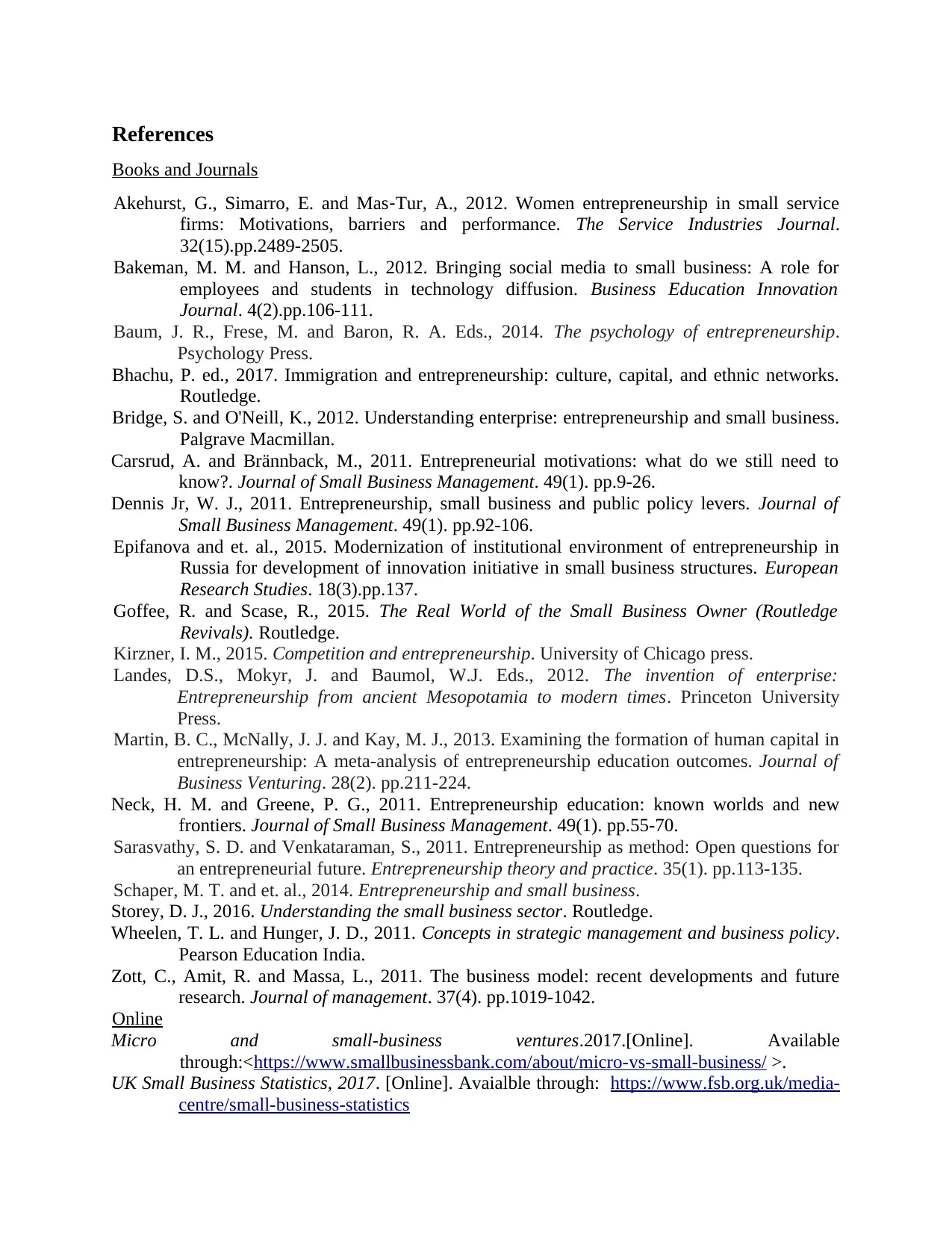
References
Books and Journals
Akehurst, G., Simarro, E. and Mas‐Tur, A., 2012. Women entrepreneurship in small service
firms: Motivations, barriers and performance. The Service Industries Journal.
32(15).pp.2489-2505.
Bakeman, M. M. and Hanson, L., 2012. Bringing social media to small business: A role for
employees and students in technology diffusion. Business Education Innovation
Journal. 4(2).pp.106-111.
Baum, J. R., Frese, M. and Baron, R. A. Eds., 2014. The psychology of entrepreneurship.
Psychology Press.
Bhachu, P. ed., 2017. Immigration and entrepreneurship: culture, capital, and ethnic networks.
Routledge.
Bridge, S. and O'Neill, K., 2012. Understanding enterprise: entrepreneurship and small business.
Palgrave Macmillan.
Carsrud, A. and Brännback, M., 2011. Entrepreneurial motivations: what do we still need to
know?. Journal of Small Business Management. 49(1). pp.9-26.
Dennis Jr, W. J., 2011. Entrepreneurship, small business and public policy levers. Journal of
Small Business Management. 49(1). pp.92-106.
Epifanova and et. al., 2015. Modernization of institutional environment of entrepreneurship in
Russia for development of innovation initiative in small business structures. European
Research Studies. 18(3).pp.137.
Goffee, R. and Scase, R., 2015. The Real World of the Small Business Owner (Routledge
Revivals). Routledge.
Kirzner, I. M., 2015. Competition and entrepreneurship. University of Chicago press.
Landes, D.S., Mokyr, J. and Baumol, W.J. Eds., 2012. The invention of enterprise:
Entrepreneurship from ancient Mesopotamia to modern times. Princeton University
Press.
Martin, B. C., McNally, J. J. and Kay, M. J., 2013. Examining the formation of human capital in
entrepreneurship: A meta-analysis of entrepreneurship education outcomes. Journal of
Business Venturing. 28(2). pp.211-224.
Neck, H. M. and Greene, P. G., 2011. Entrepreneurship education: known worlds and new
frontiers. Journal of Small Business Management. 49(1). pp.55-70.
Sarasvathy, S. D. and Venkataraman, S., 2011. Entrepreneurship as method: Open questions for
an entrepreneurial future. Entrepreneurship theory and practice. 35(1). pp.113-135.
Schaper, M. T. and et. al., 2014. Entrepreneurship and small business.
Storey, D. J., 2016. Understanding the small business sector. Routledge.
Wheelen, T. L. and Hunger, J. D., 2011. Concepts in strategic management and business policy.
Pearson Education India.
Zott, C., Amit, R. and Massa, L., 2011. The business model: recent developments and future
research. Journal of management. 37(4). pp.1019-1042.
Online
Micro and small-business ventures.2017.[Online]. Available
through:<https://www.smallbusinessbank.com/about/micro-vs-small-business/ >.
UK Small Business Statistics, 2017. [Online]. Avaialble through: https://www.fsb.org.uk/media-
centre/small-business-statistics
Books and Journals
Akehurst, G., Simarro, E. and Mas‐Tur, A., 2012. Women entrepreneurship in small service
firms: Motivations, barriers and performance. The Service Industries Journal.
32(15).pp.2489-2505.
Bakeman, M. M. and Hanson, L., 2012. Bringing social media to small business: A role for
employees and students in technology diffusion. Business Education Innovation
Journal. 4(2).pp.106-111.
Baum, J. R., Frese, M. and Baron, R. A. Eds., 2014. The psychology of entrepreneurship.
Psychology Press.
Bhachu, P. ed., 2017. Immigration and entrepreneurship: culture, capital, and ethnic networks.
Routledge.
Bridge, S. and O'Neill, K., 2012. Understanding enterprise: entrepreneurship and small business.
Palgrave Macmillan.
Carsrud, A. and Brännback, M., 2011. Entrepreneurial motivations: what do we still need to
know?. Journal of Small Business Management. 49(1). pp.9-26.
Dennis Jr, W. J., 2011. Entrepreneurship, small business and public policy levers. Journal of
Small Business Management. 49(1). pp.92-106.
Epifanova and et. al., 2015. Modernization of institutional environment of entrepreneurship in
Russia for development of innovation initiative in small business structures. European
Research Studies. 18(3).pp.137.
Goffee, R. and Scase, R., 2015. The Real World of the Small Business Owner (Routledge
Revivals). Routledge.
Kirzner, I. M., 2015. Competition and entrepreneurship. University of Chicago press.
Landes, D.S., Mokyr, J. and Baumol, W.J. Eds., 2012. The invention of enterprise:
Entrepreneurship from ancient Mesopotamia to modern times. Princeton University
Press.
Martin, B. C., McNally, J. J. and Kay, M. J., 2013. Examining the formation of human capital in
entrepreneurship: A meta-analysis of entrepreneurship education outcomes. Journal of
Business Venturing. 28(2). pp.211-224.
Neck, H. M. and Greene, P. G., 2011. Entrepreneurship education: known worlds and new
frontiers. Journal of Small Business Management. 49(1). pp.55-70.
Sarasvathy, S. D. and Venkataraman, S., 2011. Entrepreneurship as method: Open questions for
an entrepreneurial future. Entrepreneurship theory and practice. 35(1). pp.113-135.
Schaper, M. T. and et. al., 2014. Entrepreneurship and small business.
Storey, D. J., 2016. Understanding the small business sector. Routledge.
Wheelen, T. L. and Hunger, J. D., 2011. Concepts in strategic management and business policy.
Pearson Education India.
Zott, C., Amit, R. and Massa, L., 2011. The business model: recent developments and future
research. Journal of management. 37(4). pp.1019-1042.
Online
Micro and small-business ventures.2017.[Online]. Available
through:<https://www.smallbusinessbank.com/about/micro-vs-small-business/ >.
UK Small Business Statistics, 2017. [Online]. Avaialble through: https://www.fsb.org.uk/media-
centre/small-business-statistics

⊘ This is a preview!⊘
Do you want full access?
Subscribe today to unlock all pages.

Trusted by 1+ million students worldwide
1 out of 12
Related Documents
Your All-in-One AI-Powered Toolkit for Academic Success.
+13062052269
info@desklib.com
Available 24*7 on WhatsApp / Email
![[object Object]](/_next/static/media/star-bottom.7253800d.svg)
Unlock your academic potential
Copyright © 2020–2026 A2Z Services. All Rights Reserved. Developed and managed by ZUCOL.




